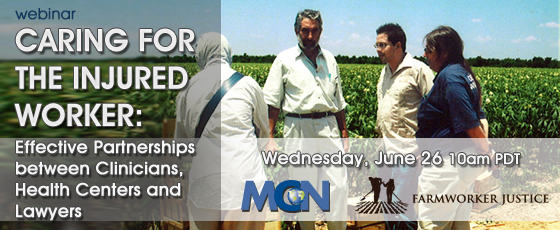Part 4 of 7 webinars in the CLINICIAN ORIENTATION TO MIGRATION HEALTH series.
DATE RECORDED: May 15, 2013
PRESENTERS: Amy K. Leibman, MPA, MA, Director of Environmental and Occupational Health, Migrant Clinicians Network
Dr. Mike Rowland, MD, MPH, Vice President, Medical Affairs and Medical Director, Occupational Health, Franklin Memorial Hospital
OBJECTIVES:
- Recognize the unique health risks of migrants due to their working conditions and environment
- Identify promising practices in environmental and occupational health that are feasible to implement in Migrant and Community Health Centers
- Utilize online clinical and patient education tools and resources to recognize, prevent and manage environmental and occupaional illnesses and injuries

